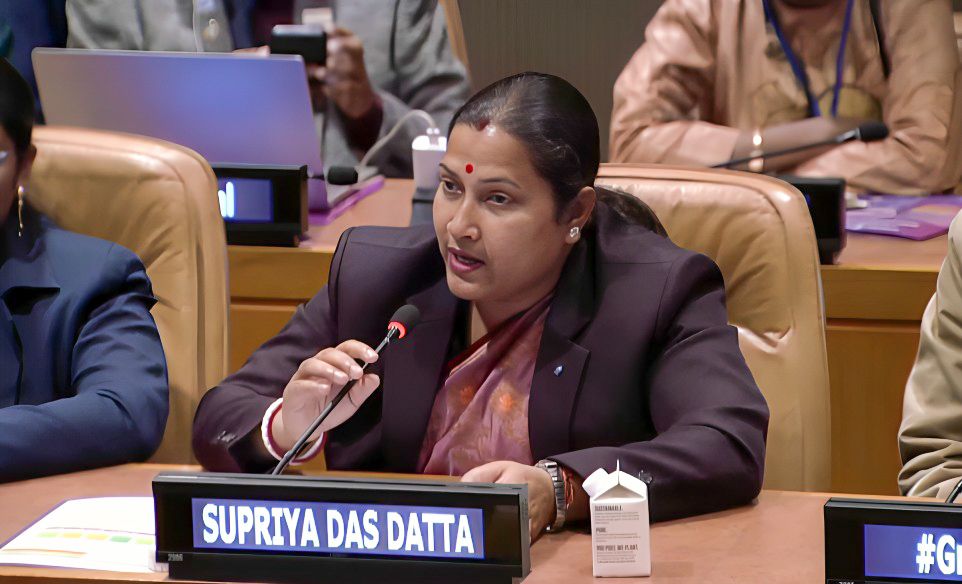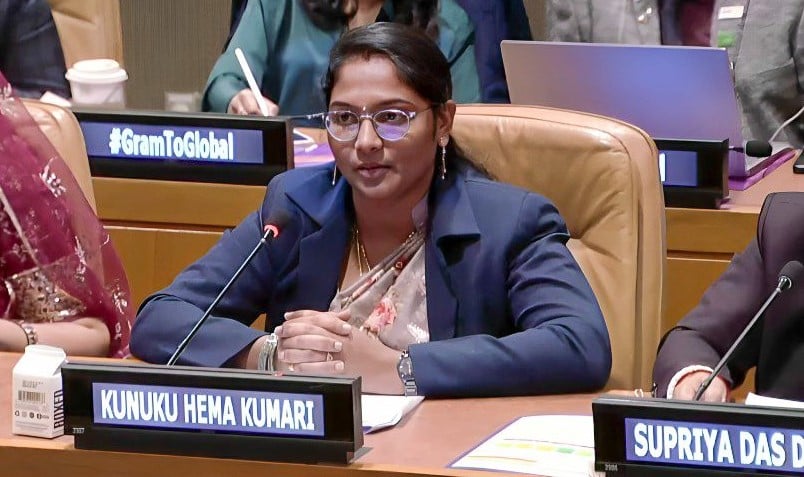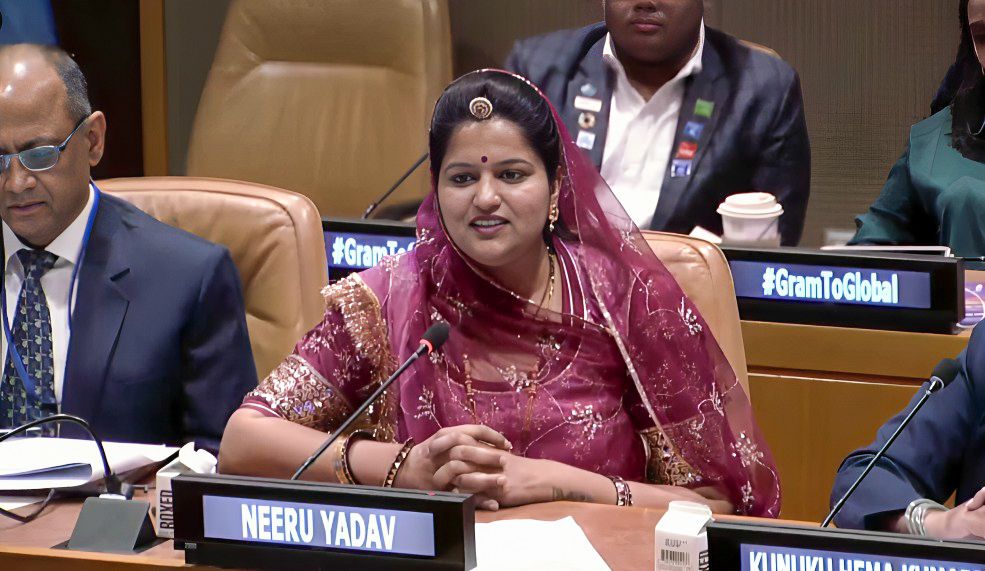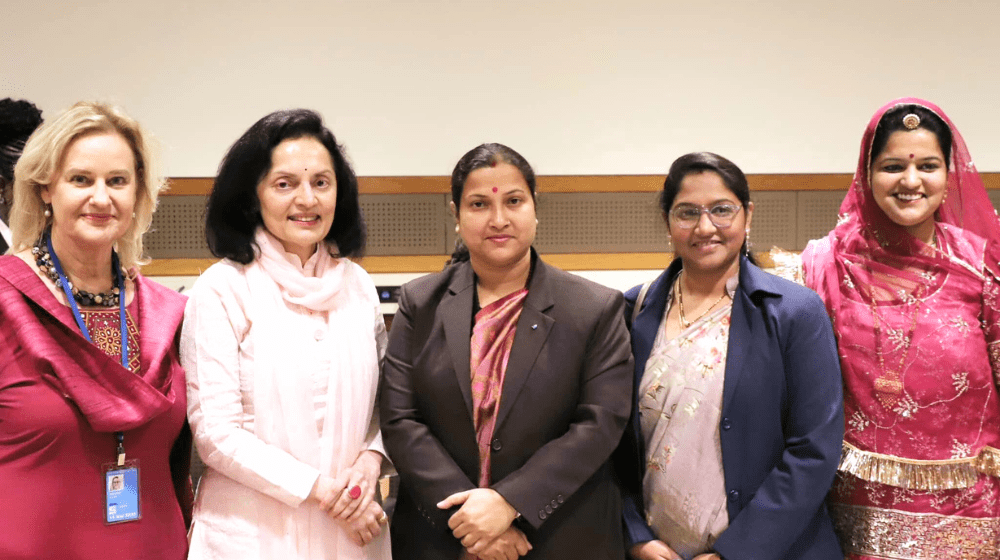From Frontline to Front Office: Breaking Barriers and Stereotypes in India
Among 1.4 million Elected Women Representatives in India’s local governance system, Supriya Das Datta, Hemakumari, and Neeru Yadav, are championing causes within their communities to improve the lives of women and girls.
Their individual stories and community-led development initiatives are a testament to the fact that investing in women's empowerment and leadership can lead to a sustainable future.
In Tripura, Supriya, an Elected Women Representative was instrumental in exponentially increasing participation in Self Help Groups in her community, with numbers surging from 600 to over 6,000 women. A definitive symbol of women’s participation in the development and growth of their village, she says, “I pushed for a specific time during Gram Sabhas (Village Council Meetings) where women could share their issues. I created a platform called ‘Tomader Kotha Bolte Hobe’ (Your story must be told), which started as a non-political platform, and gradually grew into a big movement”.
In Andhra Pradesh, the dedication of Hemakumari, an Elected Women Representative is commendable as she centers her initiatives around empowering women through health, education, and financial independence programmes, organizing regular medical camps and public outreach activities to ensure last-mile coverage of medical services, particularly for women and girls.
In Rajasthan, Neeru, locally hailed as the ‘Hockey Sarpanch’ plays a pivotal role in igniting a passion for the sport in her community, empowering young girls to reach their fullest potential by establishing a girls' hockey team. As an Elected Women's Representative, Neeru has also been a strong advocate for environmental sustainability. Recognising the urgency of tackling plastic waste, she set out to make her Panchayat plastic-free. Establishing a utensil bank, where steel replaces plastic at weddings, and encouraging shops to use cloth bags crafted by local women, Neeru advocates for sustainability while creating employment opportunities for women.
The initiatives and actions of Supriya, Hemakumari, and Neeru are a glimpse of what's possible when women lead. When countries invest in women's leadership at all levels, it is possible to unlock a future where women are not just participants, but drivers of a more just, equitable, and sustainable world.
Shining bright at the 57th Commission for Population Development
In showcasing the transformative potential of women in local governance on a global-scale, these three inspiring Elected Women Representatives from India stepped into the spotlight to share their journeys of localising the Sustainable Development Goals to improve the lives of women and girls, at the 57th session of the Commission on Population and Development (CPD), held in April 2024 in New York.
On the sidelines of the CPD, the Government of India together with UNFPA hosted an event titled "Localizing the Sustainable Development Goals (SDGs): Women in Local Governance in India Lead the Way.". The focus was to share valuable lessons and insights from India's experience with the Panchayat Raj Institutions (Local Government Councils), focusing on strategies for promoting gender equality and women's empowerment through poverty reduction and inclusive development.



During this event, Supriya, Hemakumari and Neeru, shared their unique experiences and the different causes they work towards within their communities.
The speakers for the event also included Ambassador Ruchira Kamboj, Permanent Representative of India to the United Nations; Diene Keita, Deputy Executive Director of UNFPA; Ambassador Andreas Løvold, Deputy Permanent Representative of Norway;Vivek Bharadwaj, Secretary of Ministry of Panchayati Raj; Pio Smith, UNFPA Asia-Pacific Regional Director; Alok Prem Nagar, Joint Secretary of Ministry of Panchayati Raj; and the event was moderated by UNFPA India Representative, Andrea M. Wojnar.
Read more here.
Lessons from India for South-South Cooperation
India's success in strengthening the participation of women in governance lies in its approach to the Sustainable Development Goals at all levels – from the national government to village councils.
While replicating successful programmes can be beneficial, constant evaluation and adaptation are crucial for addressing the unique challenges faced by women in different regions. Speaking during the CPD side-event, Pio Smith, UNFPA Asia-Pacific Regional Director, elaborated on the crucial role of South-South and Triangular Cooperation in fostering collaborative learning and contextualising effective strategies to meet the needs of diverse women and girls. He said, “By facilitating the exchange among partners of best practices, including India, UNFPA aims to amplify the impact of initiatives that promote gender equality,” a linchpin in accomplishing all global goals.
India's success in empowering women at the local level, like Supriya, Hemakumari, and Neeru, offers a powerful blueprint for global action. As Andrea Wojnar, UNFPA India Representative stated at the side-event, "Women in local governance in India lead the way. If India achieves the SDGs, the world achieves the SDGs".


